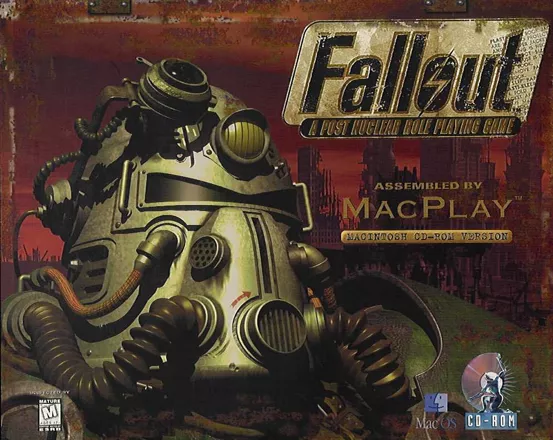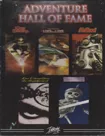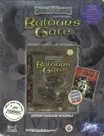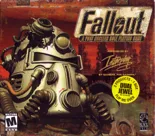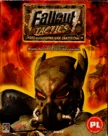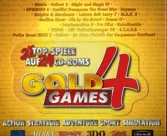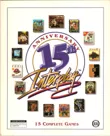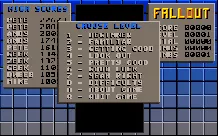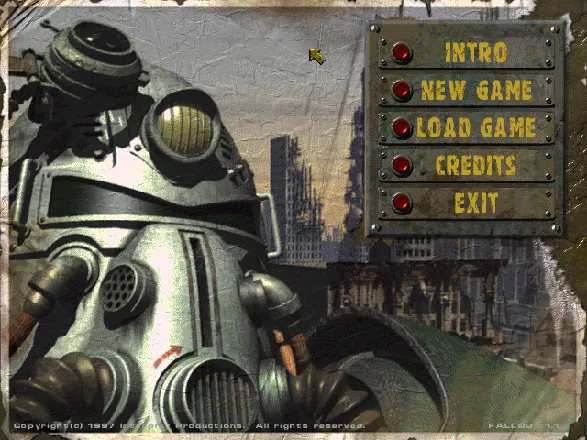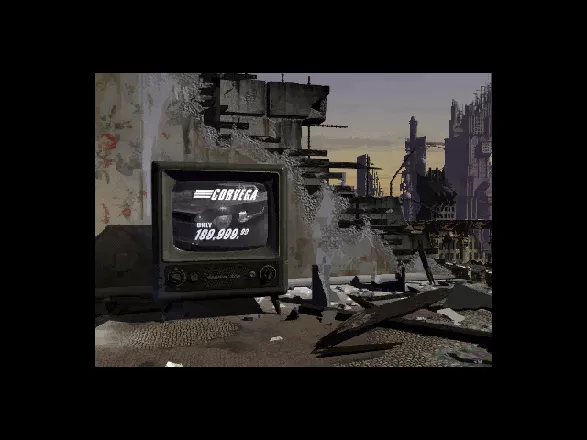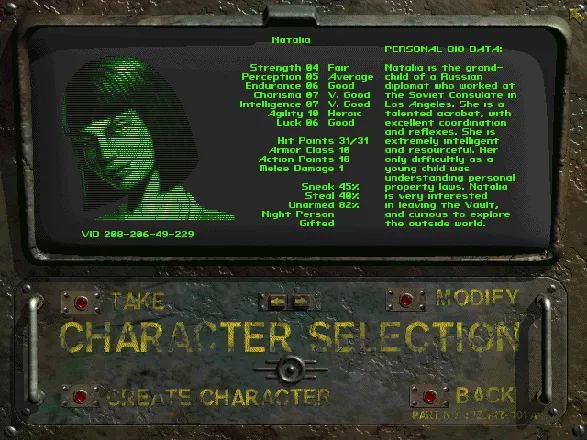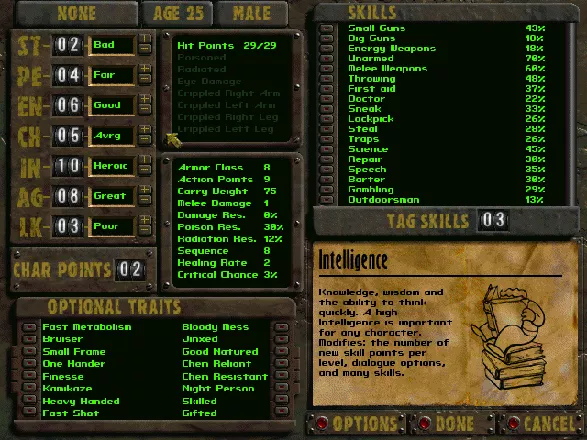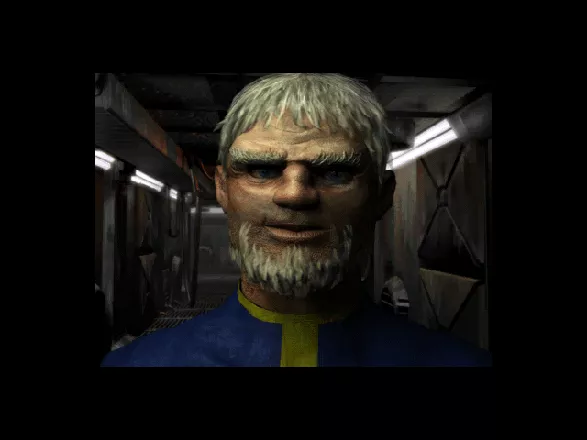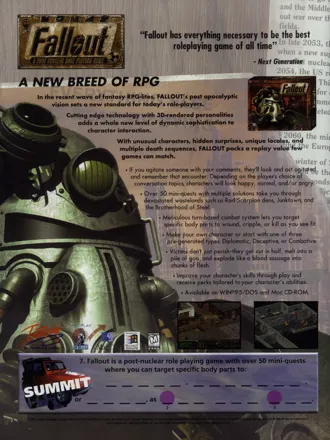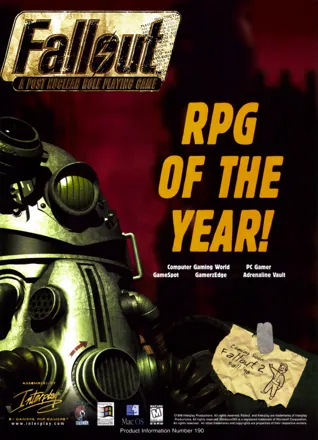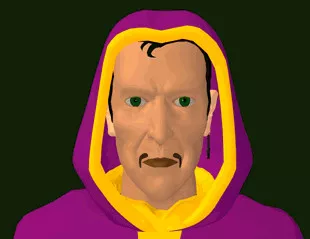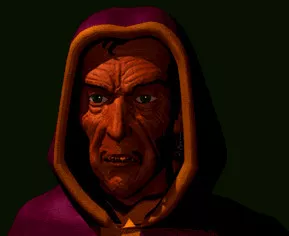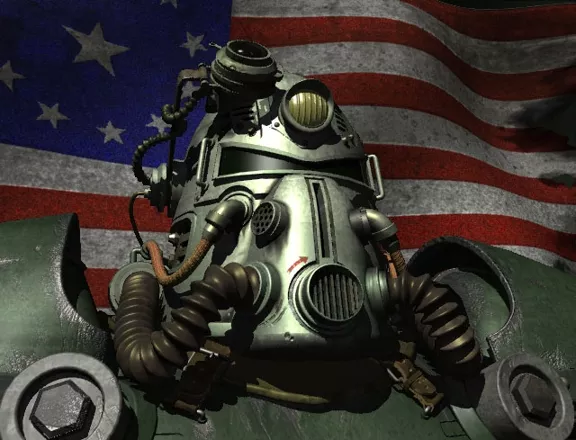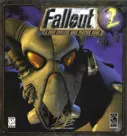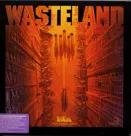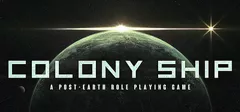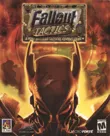Fallout
Description official descriptions
A devastating nuclear war had wiped out almost the entire population of the Earth. The civilization, as we know it, has been destroyed. The Earth has become a huge wasteland populated by mutated creatures. Only small number of humans survived and they formed communities living on the surface, where they mostly scavenge what remains from the pre-war civilization. Some lucky people managed to reach safety of the Vaults, huge underground dwellings, during the war. Recently, the water purification controller chip in Vault 13 broke. Without clean water, the people of the Vault cannot survive. One person is sent to find a replacement chip and ventures outside to face a dangerous world, hoping to return within a hundred and fifty days.
Fallout is a role-playing game that utilizes a character development system called S.P.E.C.I.A.L., an acronym formed from the first letters of the game's basic character attributes: Strength, Perception, Endurance, Charisma, Intelligence, Agility and Luck. In addition to having these attributes, the protagonist can also learn and improve skills, as well as acquire traits and perks.
Skill points are awarded when the player character levels up; traits are assigned during character creation, while perks are obtained every three character levels. There are eighteen different skills in the game, divided into combat, active, and passive categories. Combat skills include weapon proficiencies (e.g. small and big guns, melee, etc.); active skills are used for support or interacting with the environment (doctor, lockpick, science, steal, and others); passive skills are mainly dedicated to social interaction (barter, speech, gambling, and so on). Traits bestow various benefits upon the character while also imposing penalties; in contrast, perks are purely beneficial. By developing and customizing attributes, skills, traits and perks, the player is granted a considerable freedom in shaping the protagonist in his combat-related and social behavior.
The game has an open world which can be freely explored from the onset. Only a few quests are required to complete in order to advance the main plot; a vast amount of side quests is available. Thanks to the game's emphasis on social interaction, many problems can be solved in a non-violent way; in fact, it is possible to complete the game without engaging in battles at all, running away from enemy encounters and concluding the final confrontation in a relatively peaceful fashion. Conversely, the player can opt for a destructive path, killing everyone in sight. A Karma system is used to track the player's moral decisions during the game.
Combat in Fallout is turn-based. Participants have a limited amount of action points (AP) per turn; each action (including movement) depletes a certain number of AP, eventually ending a character's turn. The player can target specific body parts of enemies during battles. Characters may join the protagonist, traveling together and participating in combat as a party. Though the player may assign general commands to the companions, their actions are controlled by the AI, and they cannot be customized.
Spellings
- 異塵餘生 - Traditional Chinese spelling
- 辐射 - Simplified Chinese spelling
Groups +
- Fallout games
- Game feature: Hexagonal map
- Gameplay feature: Auto-mapping
- Gameplay feature: Character development - Skill distribution
- Gameplay feature: Day / night cycle
- Gameplay feature: Drug addiction
- Gameplay feature: Gambling
- Gameplay feature: Karma meter
- Gameplay feature: Multiple endings
- Gameplay feature: Radiation / radioactive poisoning
- Gameplay feature: Targeting system
- Protagonist: Female (option)
- Weapon: Minigun/Chaingun
Screenshots
Promos
Credits (DOS version)
154 People (140 developers, 14 thanks) · View all
| Producer | |
| Assistant Producer | |
| Division Director | |
| Asst. Division Director | |
| Original Producer | |
| Production Assistant | |
| Monkey Boy |
|
| Mac Assistance | |
| Art Director | |
| Lead Artists | |
| Artists | |
| Additional Art By | |
| [ full credits ] | |
Reviews
Critics
Average score: 88% (based on 43 ratings)
Players
Average score: 4.1 out of 5 (based on 576 ratings with 22 reviews)
The Good
Replayable, decent plot with sense of urgency, good setting, focus on role-playing, deep but uncomplicated statistic system, entertaining despite serious flaws.
The Bad
Riddled with bugs (even after a patch), half-finished feel with many incomplete areas and storylines, drastically imbalanced (towards "Easy"), many useless paths of statistic development.
The Bottom Line
Way back in 1999, I played a little game called Fallout 2. It was a blast- one of the best RPGs I've ever played. The kind of game where the first thing you want to do after finishing is go back to the start and do it all again. I played through it two or three times, until I felt I had seen all it had to offer, then made a mental note to track down the original someday. "Someday" was a long time coming. You know how it is- you get busy and things get put off. It was 2007- Fallout's tenth anniversary- before I finally got around to snagging a copy off eBay. In the meantime Fallout had been idolized, emulated, enthused about, and raised to the level of RPG classic. It is a frequent- nay, expected- presence on various "Best of All Time" lists.
Now I've played it, and... I'm surprised at how mediocre it is.
I'm sure anyone reading this will know the plot, but just in case, it goes something like this: Pretty much the entire world has been turned into an irradiated wasteland after a full-scale nuclear war. A handful of human settlements survive- most in huge underground cities called "Vaults", sealed off completely from the outside world. You were born and have been living in one such vault, Vault 13. For all of your life, the vault has been a peaceful and reasonably happy home, but now something has gone terribly wrong. The circuit board that controls the vault's water recycler is broken. They can't fix it, don't have a spare, and will run out of water in five months. The only option is to send someone out into the wasteland to track down another vault and find a new chip. Guess who drew the short straw?
Fallout is a great game in a lot of ways. The setting is well-executed- gritty, dirty, and anarchic, just like you'd expect a post-nuclear world would be. Even in later areas, the professional fighters carry knives and spears frequently, because there just aren't enough guns in the world to go around. That's brilliant. Much more significantly, the focus on dialogue and diplomacy over combat must have been revolutionary in it's time. Just like the sequel, I played it twice consecutively, and might eventually go at it a third time.
On the other hand, though, I'm often surprised at how thin it's spread. In fact, I'd say it has the worst coding and nuts-and-bolts design of any game I've ever played and liked. Subplots peter out or stop entirely. NPCs mention things that don't exist in-game, or don't exist as described (Killian is especially bad with this). Scripts misfire, breaking quests. Important NPCs vanish due to weird bugs. Quests that are referred to- in at least two cases, even appearing on the quest list- don't exist or don't seem to be completable. Cities are full of empty buildings and generic NPCs. Several areas are blatantly half-finished. If this game were released today, even with the RPG market in the state it is today, it would be lambasted by critics, derided on the internet, and flop mightily on the shelves- frankly, it's "beta in a box".
There are much deeper issues, too. Although in many ways the best-executed part of the game, the overarching plot is drastically overrated. The water-chip quest is really just a McGuffin to motivate you on from town to town, resolving the troubles of the populace along the way. The plot that develops later is just plain old you vs. the bad guys, with a hint of mad-scientist. With slight modifications, I've seen it before. Numerous times. The ending IS ingenious, but it can't obscure the mundanity preceding.
The stat system is a huge flaw. I won't knock the developers for that, because I don't think it's their fault. Fallout was originally supposed to use an electronic adaptation of Steve Jackson Games' pen-and-paper GURPS system. Somewhere along the way, though- by accounts I've heard, rather close to release- Interplay and SJG had a falling-out, and instead the developers cooked up a homebrew system called SPECIAL.
SPECIAL is pretty simple- at game start, you choose cosmetic details- age, name, sex- then distribute 35 points among seven statistics that each have a range of 1-10. These statistic values determine characteristics such as hit points and carry weight, and the starting values of your skills. Skills are on a percentile scale, each calculated from one or two statistics using a different formula. You choose three "Tag Skills"- things you do especially well. Lastly, you choose up to two traits. Traits confer powerful extra benefits, but are typically double-edged. Gifted, for example, gives you 7 bonus statistic points but your skills will be less developed. Finesse gives you less damage on standard attacks but more on critical hits, and so on.
Once the game starts, you increase your abilities by gaining experience levels. At each new level, you get more hit points and more skill points. Skill points are spent to increase your skills- one skill point for one percentage point in a given skill. You can go above 100%, but you get diminishing returns. To your Tag Skills you get a 20% bonus at start, and they also increase twice as fast- one skill point equals two percentage points in the skill. Also, every third level you get a bonus ability called a perk, some of which are very powerful.
All pretty good- simple to understand yet with an appealing complexity. The problem is, it's radically imbalanced. Without giving stuff away, once you know the game you can draw up a quick list of "must have" tags, stat values, and traits, and use that to coast through 90% of the game with any other reasonable values you wish. Many skills are useless- Big Guns pales next to Energy Weapons. First Aid is useless due to the abundance of stimpaks. Doctor is useful only when you get hit with a crippling critical, which hasn't happened to me yet. Outdoorsman is a joke. Traps only show up in one area. Sneak is nearly useless next to fast-talking and an occasional disguise.
Monty Hall also makes his presence known- after getting finished with the third town, you have more money than you know what to do with, and after completing a certain major side-quest, you'll never need cash again.
Yet bizarrely, I still love it. That's not some half-baked internet equivocation- It really is the most enjoyable game I've played all year. (Except for a Fallout 2 replay, heh.) I'm at a loss for explanations. I guess the elusive "fun factor" really is hard to define.
I will defend Fallout as worth playing, but I'm unconvinced it deserves the title "classic". If you ask me, the sequel- often derided as inferior- is actually a much better game. It's more solid, more developed, better written, and significantly less half-baked. As I write this Fallout 3 is in development, from a different studio known for a much different design philosophy. The fanboys, as fanboys are want to do, are prophesying doom- a lousy game that disgraces the Fallout name. Maybe they're right. Maybe not. We'll find out when the game comes out. But after hearing the entire gaming community enthuse, and then seeing what they're enthusing about firsthand, Fallout is frankly almost a disgrace to it's own name. The emperor is... well, no, not REALLY stark naked, but dressed like Carl from Aqua Teen Hunger Force.
Windows · by SBell (3) · 2007
One of the best(if not the best) CRPG ever- a classic!
The Good
A post-nuclear role-playing game!!!
Well this is is almost perfect in my opinion.
it's oozes style!
First of all the story is original! with some of the best ending I have ever seen.
The atmosphere in this game is extraordinary.
also the graphics while outdated (VERY outdated) are still pleasant to the eye.
CGI movies are just GREAT (even for today standards).
But the main thing that makes this game fantastic is the gameplay-
the gameplay is pure drug! i couldn't stop playing until i finished it!
you have multiple endings (depends on your actions) - you can play a good guy and a bad guy(and it will change your KARMA).
Interface is very easy to use.
Good tactical combat system.
Great black humor!!!
The soundtrack is highly ambient and spooky.
lots of conversations to do.
and there's lots of gore(for all of the gore fans- you can do very messy things to human bodies!)
and there aren't any goblins or orcs.
it's definitely one of the most detailed CRPG yet.
The Bad
well not much but...
Interaction with NPCs is a bit disappointing.
low resolution (640X480).
and tons of bugs! you must download the patch before playing!
The Bottom Line
Highly recommended CLASSIC.
if you enjoy RPGs just get it.
Buy it, kill for it, just get it.
Windows · by BlackNightmare (259) · 2004
A CRPG as enjoyable as it is buggy (and it's really, really buggy...)
The Good
It looks great, it sounds great, it plays great, and it doesn't have character classes. As far as I am concerned, computer games need not (and quite possibly can not) advance beyond the level of excellence this game offers. All things considered, this is one of the most involved (involving? whatever...) computer RPG/adventure games ever, as it actually enables the player to play any kind of character he wants. I mean, real people don't go around with "I'm a Mage, please stab me" tattooed on their foreheads (I hope), and they still manage to do their own stuff and whatnot and you know what I mean.
[Added later:]
One thing I forgot to mention when originally writing this review is the excellent presentation. Right from the loading screen through the magnificent intro sequence to the [REMOVED] end (oops, almost slipped a spoiler) you get sucked into the post-apocalyptic world of Fallout. It's also very re-playable, as I found out when I recently purchased Fallout 2 and it came with the original. Depending on the PC you create and how you actually play the game, you're always finding out new stuff. (The truth apparently is out there.)
The Bad
This game is buggy. Bugs all over the shop. Ugly ones, to boot. Also, once your PC is strong enough, you can do stuff that screw some of the responses up, although I guess that really counts as a bug, too.
[Added later]
All right, I now have a more recent version, and some of the more annoying bugs seem to have vanished, but you still sometimes have to try some things several times in slightly different ways to trigger the correct reactions. Of course, if I hadn't played Fallout before, I wouldn't have noticed the problems.
The Bottom Line
If you liked Baldur's Gate, you'll love this game (you never even have to change the CD). It has one of the best plots, settings, and overall feels I've ever come across in a computer game, and it's not too easy, either.
Get it.
[Added later] Hey, you don't actually have to like Baldur's Gate to love Fallout!
Windows · by Late (77) · 2001
Discussion
| Subject | By | Date |
|---|---|---|
| I guess I'm a bit annoyed by open-endedness. | chirinea (47496) | Jun 23, 2015 |
| Again a Fallout (Jewel Case) cover | bubbleman1987 | Sep 5, 2012 |
| Countries where have been sold the Fallout games | bubbleman1987 | Sep 1, 2012 |
| Unknown Cover | bubbleman1987 | Sep 1, 2012 |
| GOG.com giveaway | Cavalary (11445) | Apr 5, 2012 |
Trivia
1001 Video Games
Fallout appears in the book 1001 Video Games You Must Play Before You Die by General Editor Tony Mott.
AI
The artificial "intelligence" makes the characters do some pretty amazing (amazingly stupid, anyway) things. Twice I have had _all_ friendly NPCs in combat repeatedly picking up a lit flare I'd dropped and throwing it at the enemy. An AI routine that makes people with firearms try to whack their opponents with flares deserves mention, in my opinion.
Alternative credits
Hold down shift key and click on the Credits button to see some alternative credits.
Bugs
Fallout shipped with a number of blatantly obvious bugs that almost inevitably seriously screwed up the game. One of the most amusing bugs caused Ian (one of the NPCs that can join your party) to suffer from "Agent Smith Syndrome", multiplying rapidly until there were 100s of him running around the game world killing everybody.
Besides screwing up the game world, this would also cause your game to slow to a crawl because whenever combat started, you'd have to wait for every single Ian to take their turn before control is returned to you.
Concept Art
As of 2002 people who worked on the Fallout games are employed by Black Isle or Troika Games, and have released a number of pre-production drawings and sketches. Thanks to "fallout.scifi.pl" website, you can see them in one place. Sketches - posters - un-used GURPS Vaultboy art
Fallout Bible
The best source of Fallout design and production memoirs, world history, and rare interviews would be "Fallout Bible", found on both official Black Isle website, and on "Duck and Cover" fan-site.
Goodies
Original release includes a "Goodies" folder that includes a Windows screensaver as well as the prototype version of the game developed in 1994, which consists of a knight walking around an isometric landscape and which would eventually evolve into the Fallout engine (requires dos4gw to run).
GOG release
In December 2013, Fallout, Fallout 2 and Fallout Tactics were given away for free on the download distribution platform GOG. This was the last month Interplay had the distribution rights for the games before they went to Bethesda. The games were pulled from GOG on January 01, 2014. They were readded to the catalogue with Bethesda as publisher on August 26, 2015.
Inconsistencies
The Fallout manual says the thickness of Vault's blast door is '4 yards of steel'. 1 yard is almost 1 meter, which means the door's thickness is more than twice your height. That's 12 feet! In comparison, NORAD's 25 ton door is mere 3.5 feet thick.
Low intelligence
If you create your own character, you need to have an intelligence of at least 4. Any lower than that, and you will find it very hard to complete the game because you can't converse with anyone -- your only dialogue options are various grunts or other gutteral noises. I'd recommend trying it once, as it's rather amusing.
An interesting aside is that the dialogue with the cook in Shady Sands doesn't seem to be affected... a character with the lowest possible intelligence can still proclaim, "That smells great! I bet it tastes terrific!" Must be some good food, indeed.
Maybe
The song that plays during the introduction and closing credits is Maybe by the Ink Spots, a black vocal quartet from the 1930s-1940s. As of 2001 most of their work has been re-released and can be bought for $10 - $12 per CD.
Recipes
Fallout's manual comes with a "survival recipes" appendix, which has actual recipes!
References
- The game includes all sorts of odd references - you may stumble onto a UFO which has a sign reading, 'Property of Area 51. Please return if found' and an alien corpse with a ray gun and a picture of Elvis.
- There is a way cool reference to the 1960's era blue UK Police Box that gives you a motion scanner. Doctor Who fans will pick up on that one. The TV which appears in the Introduction Movie is a Radiation King. In The Simpsons*, Homer once said that he spent hours as a child watching tv in the old Radiation King.
- Set your Windows to use large icons and have a look at the Fallout icon or shortcut. This is probably a face of one of game's creators.
- If you search the log files in the computer in the upper level of the Military Base, you will see that two of the names in the actually are developers of the game: Boyarsky and Anderson. Try to download those log files and you will get an "unexpected end of line" error message.
- At one point you'll have the opportunity to chat with a member of the Brotherhood of Steel who says the line "I'm here to kick ass and chew bubble gum. I'm all out of gum". This is a play on the memorable "I have come here to chew bubblegum and kick ass... and I'm all out of bubblegum." from the movie They Live which is also referenced in Duke Nukem 3D.
- There are references to Mad Max in the game. Dogmeat is the first reference, as Max has a dog in Mad Max 2. In addition, when the description of the previous owner of Dogmeat is given, it describes a person with a shotgun and wearing a leather jacket. This is basically what Max wears in Mad Max 2. The shotgun is his weapon in the movie as well. The other reference is in the ending cinematic. The player has a single barrel shotgun on his hip, same as Max, the player wears what appears a shoulder section of the football pads on his left shoulder, so does Max. There is a bit a limp in player's walk, Max limps because of his injured knee. Finally player is heading in to the wasteland just like Max did at the end of his movies.
References to Wasteland
There are several references to the original Wasteland in the game: * Far Go Traders: Brian Fargo was one of the lead developers of the original Wasteland game. * Tycho: Talk to him a bit, and you find out that he's been through "Ranger Training". In Wasteland, the Desert Rangers were the "heroes" of the game. * The Red Ryder BB gun: Red Ryder showed up in the small town of Highpool in Wasteland (eerily similar to Shady Sands in Fallout). In Fallout, the Red Ryder LE BB Gun is one of the more powerful non-energy weapons you can find, if you're lucky. * Dugan, the Blades' Nuka-Cola addict, is probably named after Bill Dugan, who was part of the Wasteland team
RPG System
During early stages of development, Fallout was designed using G.U.R.P.S. roleplaying system. However, when Steve Jackson Games (owners of G.U.R.P.S. license) pressured the development team to cut down on violence, a decision was made to switch to S.P.E.C.I.A.L., home-brewn rules-light GURPS clone, and abandon G.U.R.P.S. altogether.
Secrets
During your travels from city to city, you may come across a GIANT footprint in the ground with a bloody mess in the middle of it. Search the mess and you will find a Stealth Boy.
I guess the Stealth Boy works really well, since the thing that stepped on the guy carrying the (active) Stealth Boy never saw him. :-)
Text to speech
The Macintosh version of the game supported a system extension called "Text-to-Speech" which enabled text on screen to be read out by a computer generated voice. The game's PipBoy could be used with the extension which "spoke" all replies this PDA like device gave the user. For example, when the player used the alarm clock to rest the PipBoy would speak a long-stretched wake-up call: "waaake uuup!".
The option for "PipBoy speech" could be toggled in the options menu.
Time limit
The original release of the game had a 500 days time limit in which to complete the game (400 if you hired the water merchants). This was because the mutant army was constantly looking for your vault, which they eventually find and invade once the limit expires. The limit was removed on the subsequent patches, but you can still see the cutscene that played when the limit expired if you select to willingly join the army and reveal the vault's location to the master.
Although you no longer get an automatic "game over" after 500 days after installing the patches, taking too long to finish the game still has consequences. The mutant army is still on the march, and even if they no longer can seize your vault, they will still gradually conquer the various towns as time progresses. This has no in-game effect (the mutants don't actually show up in the towns), but during the game's ending you'll get a bad "we got smooshed" ending for places like the Necropolis, Hub, or Followers if you took too long to stop the mutants.
Violence
In the game's options, you can adjust the game's violence level: * US Release - 4 violence levels available - no cuts * UK Release - 3 violence levels available - the most brutal setting is blocked * German Release - 2 violence levels available - the two most brutal settings are missing...
In both the UK and German release all children are missing.
Awards
- Computer Gaming World
- March 1998 (Issue #164) – Role-Playing Game of the Year
- June 2000 (Issue #191) – Introduced into the Hall of Fame
- GameStar (Germany)
- Issue 12/1999 - #51 in the "100 Most Important PC Games of the Nineties" ranking
- PC Gamer
- April 2000 - #18 in the "Readers' All-Time Top 50 Games" Poll
- October 2001 - #4 in the "Top 50 Games of All Time" list (together with Fallout 2)
- April 2005 - #10 in the "50 Best Games of All Time" list
- Power Play
- Issue 02/1998 – Best RPG in 1997
Information also provided by Adam Baratz, Ajan, Alan Chan, Alexander Schaefer, ApTyp, Entorphane, Fire Convoy, glidefan, Heikki Sairanen, Kabushi, Late, MirrorshadesUK, n-n, PCGamer77, Trixter, Ye Olde Infocomme Shoppe, ZombieDepot, Zovni and Evolyzer
Analytics
Upgrade to MobyPro to view research rankings!
Related Sites +
-
DOSBox Wiki
The encyclopaedic page of the DOSBox project. -
DOSBox, an x86 emulator with DOS
Compatibility information page about the original game and its DOSBox versions. -
Duck and Cover
One of the most well-known Fallout fan sites. -
Fallout Wastelands - The Vault Dweller's Survival Guide
An excellent unofficial fan site for the Fallout series. -
IMDb, the Internet Movie Database
Game database entry: reviews, trailers, ratings. -
Interplay's archived site
Copy of Interplay's Fallout official page at Internet Archive -
Macintosh Garden, an abandonware games archive
For Macintosh: reviews; game packaging; downloadable releases; manual; screenshots; additional material. -
Macintosh Garden, an abandonware games archive (Classic Mac OS)
For Classic Mac OS: reviews; game packaging; downloadable releases; manual; screenshots; additional material. -
Matt Chat 66
Video interview with Tim Cain about the development and reception of Fallout (part 1/2) -
Metacritic (PC)
For PC: reviews; ratings; critics; trailers; additional material. -
Movie-Censorship.com
Comparison between the uncensored US version and the censored European version. -
No Mutants Allowed
Real Fallout fans never die - they just get a little radioactive after a while! NMA is the most comprehensive unofficial Fallout series site on the internet. -
RPG Classics - Fallout Shrine
Fan made shrine for Fallout includes a walkthrough, weapon/armor information, and a list of easter eggs found in the game. -
Replacementdocs (PC, Manual)
Documentation for DOS/Windows. -
Replacementdocs (PC, Quick Reference Card)
Documentation for DOS/Windows. -
The Vault
Wiki based encyclopedia about all things Fallout.
Identifiers +
Contribute
Are you familiar with this game? Help document and preserve this entry in video game history! If your contribution is approved, you will earn points and be credited as a contributor.
Contributors to this Entry
Game added by Droog.
OnLive added by firefang9212. Linux added by Evolyzer. Macintosh added by LepricahnsGold. DOS added by Spartan_234. Windows Apps added by Koterminus.
Additional contributors: Unicorn Lynx, Apogee IV, Kabushi, Vaelor, Pseudo_Intellectual, jlebel, Solid Flamingo, Luchsen, Paulus18950, Tatar_Khan, Patrick Bregger, Plok, FatherJack, ZeTomes, Evolyzer.
Game added August 17, 1999. Last modified April 13, 2024.
